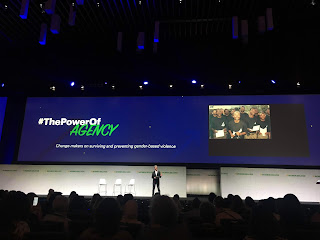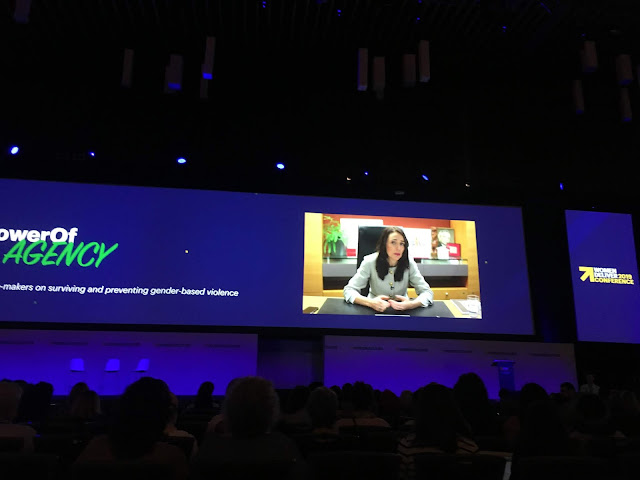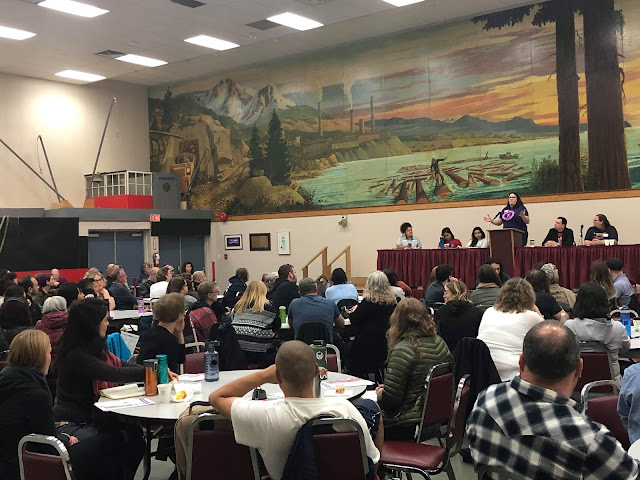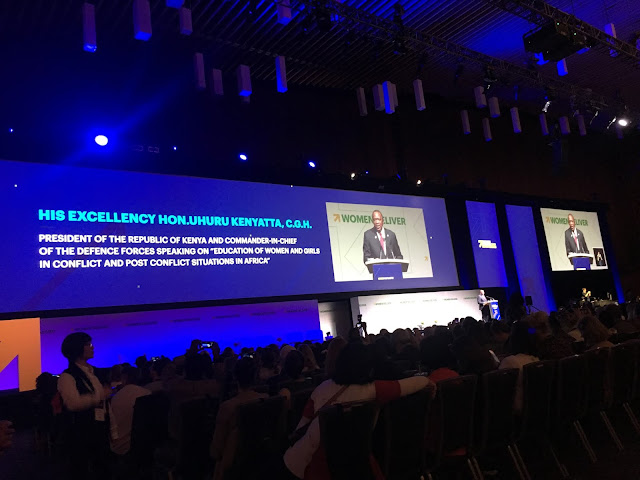Women Deliver: The Power of Agency
The Power of Agency: Changemakers on Surviving and preventing gender-based violence
Ok it was pretty cool to walk back into a plenary session at a conference to see a special video message from Prime Minister of New Zealand, Jacinda Ardern. She's so earnest. I became aware of her when she became the first woman in New Zealand to give birth in office and then like the rest of the world, was captivated by her leadership after the Christchurch massacre.
The thing that stuck with me the most (I was starving and wolfing down a burrito while she was talking) was her statement that women have the right to be themselves in politics. That we don't have to change who we are or how we play the game. That resonated with me and how I navigate union politics in all of the roles I have in the labour movement.
Now it's time for the plenary to start. This time it's not a panel discussion but a series of speakers. I really am aware how intersectional and global the sessions at this conference are. A nice break from all of the "manels" that still dominate in labour movement events.
First up is Nice Nailantei Leng-ete of Amref Health Africa talking about "the cuts" or Female Genital Mutilation (FGM). FGM is the topic of many concurrent workshops and sessions, and this is the first time I've heard from someone in person about the issue. NLL credited her teacher to resist "the cut" when she was 8 years old. 8 YEARS OLD! I was playing with My Little Ponies at 8 - it's such a privilege check when you hear of things like this. Without "the cut" she would be seen as a coward and an incomplete Masai woman. She ran away a couple of time to avoid FGM. It did come at a price - she left her sister behind. She eventually went back to her grandfather's house (she is an orphan) so she could return to her education. Her grandfather was the village elder and she had his support. She was the first girl in her village to go to high school. Now she works with Amref Africa to works to support girls who do not want FGM, to choose and alternate right of passage ceremonies. The choose celebrating the dreams of girls and their potential rather than their biology. But it takes a lot of work. It takes changing the hearts and minds of cultural leaders.
They found that the more girls who resisted FGM went to school. Even though more and more are resisting and going to school there are still 200 million girls who experience " the cut." She echoed the words of the Kenyan President at the opening plenary, that her country is looking to eradicate FGM by 2022 and in the rest of Africa by 2030.
Redi Tlhabi, our host for the plenary and South African journalist talked to us about her role in the media as a radio show host and the responsibility she felt to report the injustices in her community. It was sparked by a situation in Johannesburg where a woman was turned away from a hospital in the midst of labour just because she was Zimbabwean. That particular event had profound impact on her because it was then she realized it would not be business as usual. She had to be unapologetic and vociferous about the oppressive legal landscape in her country and it was not the kind of society she wanted to live in.
She would chime in, in between speakers. She spoke about the power of education and how it addresses all of society's ills (paraphrased from Nelson Mandela).
 Hadiqua Bashir - Girls United for Human Rights is 17 years old and is fighting child marriage in Pakistan. She started with telling us how she and her friends would play with dolls when they were little. They would have doll weddings and pretend house. Then when she was around 11 one of her friends stopped coming to play - because she was married off. As a teenager her friend endured abuse from her husband.
Hadiqua Bashir - Girls United for Human Rights is 17 years old and is fighting child marriage in Pakistan. She started with telling us how she and her friends would play with dolls when they were little. They would have doll weddings and pretend house. Then when she was around 11 one of her friends stopped coming to play - because she was married off. As a teenager her friend endured abuse from her husband.
Hadiqa's father married her off and she knew she did not want that life. She went to her uncle who supported her and told that child marriage is a crime and it changed her whole life. She was resolved to fight against child marriage and started going door to door to talk to girls and their families about early enforced child marriage. Now she also speaks to legislators trying to get the law changed so that you can't get married until you're 18 years old. She's worked with Imams. She's done all of this work in the face of death threats from extremists and her ultimate girl is to send every girl in the world off to school not off to marriage. YES!
 Next up was Mohamed Sidabay, current law school student and with the Global Partnership for Education and former child soldier from Sierra Leone. He told his origin story about witnessing the murder of his parents and then being handed an AK 47 at the age of 5 years old. My nephew is 5. At 5 years old, his mile was no more. That was hard to hear. At 10 years old, he was barefoot, running around the village, never attended school therefore couldn't read or write.He lived his life with one goal - to not go to bed hungry.
Next up was Mohamed Sidabay, current law school student and with the Global Partnership for Education and former child soldier from Sierra Leone. He told his origin story about witnessing the murder of his parents and then being handed an AK 47 at the age of 5 years old. My nephew is 5. At 5 years old, his mile was no more. That was hard to hear. At 10 years old, he was barefoot, running around the village, never attended school therefore couldn't read or write.He lived his life with one goal - to not go to bed hungry.
I can't read some of my writing so somehow he gets out of the situation he's in. He is going to law school and is living his dream now. In Sierra Leone, pregnant girls are not allowed to go to school and there is a movement to change that to ensure that there is "education for every child." He talked about the positive impact women have had on his life and that as men they "either get on board or get out of the way because the women are coming!"
He went back to Sierra Leone last Christmas to visit and really saw the impact of the relentless stress of just existing on his friends. That everyday is a struggle. He knows his hard work will pay off one day. His friends though, their goals are to survive to making it to the next day. Harsh. 263 million children are out of school and deprived of their rights to an education. When that happens, hope ceases to exist. We have so much more to do today, the time is right now.
Redi is back. Now she is sharing her experience growing up in Soweto. As she rose, she had to keep in mind to keep focus on where she came from to lift other people up. The challenges of coming from a country that in entrenched in patriarchy and is the endemic rape and sexual violence centre of the world. She talked about the unlearning that needed to happen in her community to stop the normalized violence.
 Next up Mark Kaufman from the White Ribbon Project wanted to talk about men's role in ending violence against women. The White Ribbon Project was created in Toronto in 1991 in recognition that men's silence in VAW allowed the violence to continue and to create a campaign where men and boy's could support a feminist issue like VAW. They didn't want a centralized campaign but to create a mainstream effort to engage men and boy that wasn't just an expression of concern but a public promise to commit to not being silent on VAW nor condone it by not speaking up.
Next up Mark Kaufman from the White Ribbon Project wanted to talk about men's role in ending violence against women. The White Ribbon Project was created in Toronto in 1991 in recognition that men's silence in VAW allowed the violence to continue and to create a campaign where men and boy's could support a feminist issue like VAW. They didn't want a centralized campaign but to create a mainstream effort to engage men and boy that wasn't just an expression of concern but a public promise to commit to not being silent on VAW nor condone it by not speaking up.
The White Ribbon Project is in 90 countries and has moved into working in the area of toxic masculinity to support boys and their emotions. The campaign really is a collective love letter to women in their lives.
 Dr. Daniela Legiero from Together for Girls in Brazil works to special attention and awareness to sexual violence against girls. She shared her own story of sexual abuse she experienced as a 6 year old and how she lived in silence and shame until her teenage years. Together for Girls is guided by evidence and data to make sexual violence visible. So many people don't report it's hard to know what the exact number are in many places. Some stats say that 1/4 girls and 1/9 boys experience sexual abuse before the age of 18. Oof.
Dr. Daniela Legiero from Together for Girls in Brazil works to special attention and awareness to sexual violence against girls. She shared her own story of sexual abuse she experienced as a 6 year old and how she lived in silence and shame until her teenage years. Together for Girls is guided by evidence and data to make sexual violence visible. So many people don't report it's hard to know what the exact number are in many places. Some stats say that 1/4 girls and 1/9 boys experience sexual abuse before the age of 18. Oof.
She really took the time to emphasize how important it is to support survivors and that it will take all of us to break the silence. She ended her presentation with Angela Davis' famous quote " I am no longer accepting the things I cannot change, I am changing the things I cannot accept.
Our final speaker was Hauwa, a survivor of Boko Haram and it was one of the most heartbreaking and resilient stories of the conference. She was 14 when she was taken, then proceeded to be beaten, starved, raped and stabbed. At nine months pregnant she escaped, carried a baby (the baby died). The room full of a few thousand people was on the edge of their seats to listen to her story. I pen my pen down and just listened to her story. It's one thing to read about news stories but to hear from someone who lived it...
There are still hundreds of girls missing in Nigeria. Living in horrible conditions and subjected to abuse and violence that I can't imagine. The world cared for a few minutes and then forgot about them. Even if they escape there is no where for them to go - the homes they left are probably not standing and many of their families members murdered or missing as well. It took so much courage to stand on that stage and share her story. It will stay with me for the rest of my life..






Comments
Post a Comment